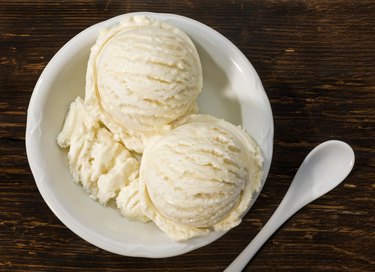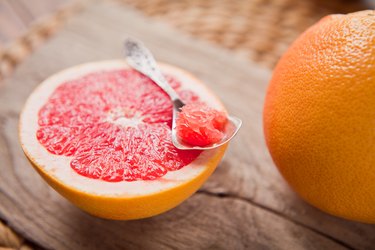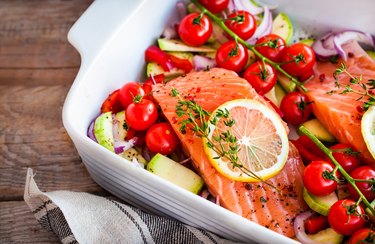
The 3-Day Military Diet is a short-term program that promises quick weight loss. While the diet wasn't created by the Army or the Navy, it is fairly restrictive and takes planning and discipline to execute — hence the name.
While the 3-Day Military Diet may help you lose a few pounds initially, it's not a sound plan for sustainable, safe weight loss, nor is it an eating regimen most experts would recommend.
Video of the Day
Video of the Day
With that in mind, here's everything you need to know about the meal plan.
Tip
Talk to your doctor before starting this or any other diet to make sure it's safe for you, according to the Mayo Clinic.
What Is the 3-Day Military Diet?
As its name implies, this plan is meant to be followed for three consecutive days, according to the diet's website.
The remaining four days of the week, you eat "normally" (though the diet recommends capping your calories at 1,500 per day for those four days for the best results) — in other words, the 3-Day Military Diet is a type of intermittent fasting.
You then repeat this diet cycle — three days on, four days off — until you reach your goal weight.
Despite its name, it's unclear if the diet was developed by someone in the military, or even what the diet's origins are.
Foods to Eat
Here's a Military Diet-approved list of what to eat on the plan:
1. Foods
The three-day diet menu is strict. Per the website's meal plan, it encourages foods such as:
- Meat, including hot dogs
- Fish like tuna
- Peanut butter
- Dairy products like cheddar cheese, cottage cheese and vanilla ice cream
- Eggs
- Fruits like grapefruit, bananas and apples
- Vegetables like green beans, broccoli and carrots
- White bread
- Saltine crackers
It's important to note that some of these foods aren't exactly brimming with beneficial nutrients. For instance, the three-day menu suggests frequently eating white toast and saltine crackers, both of which are refined grains that aren't typically recommended over whole grains like whole-wheat bread, per the Mayo Clinic.
The menu also includes highly processed foods like ice cream that may not support overall nutrition and wellbeing while you're on a calorie-restricted diet (the three-day average is about 1,200 calories).
Instead, it's important to prioritize foods that are packed with vitamins, minerals and other nutrients, according to the Mayo Clinic.
Warning
Calorie intake shouldn't drop below 1,200 per day for people assigned female at birth (AFAB) and 1,500 per day for people assigned male at birth (AMAB), except under doctor's orders, per Harvard Health Publishing. Eating too few calories can deprive you of essential nutrients.
2. Drinks
As for beverages, people following the 3-Day Military Diet are encouraged to drink only the following, per the website:
- Water
- Black coffee (only Stevia is permitted to use as a sweetener)
- Herbal tea
Alcohol is not included on the 3-day Military Diet menu, though it is technically permitted the other four days.
3. Condiments
The Military Diet bans most condiments and seasonings, as many contain lots of calories and fat. But according to the website, the following condiments and seasonings are permitted:
- Salsa
- Hummus
- Mustard
- Pesto
- Hot sauce (as long as it doesn't include added sugar)
- Lemon
- Basil
4. Substitutions
While very strict, the 3-Day Military Diet offers a fairly robust substitutions menu and, in fact, some of those swaps are more nutritious than the original menu.
For example, instead of that slice of white toast, you're permitted to sub in one of the following, according to the website:
- 1/8 cup of sunflower seeds
- 1/2 cup of whole-grain cereal
- Half of a high-protein bar
- 1/4 cup of yogurt with 1/2 teaspoon of flax seeds
Another substitution: Swap your saltine crackers for the calorie equivalent of quinoa, couscous or rice cakes.
Foods to Limit or Avoid
The program's website isn't totally clear about which foods to steer clear of while following the 3-Day Military Diet.
However, here are the foods the website does recommend eliminating from your diet:
- Artificial sweeteners
- Oranges
- Dairy products like butter and cream
- Condiments like mayo, ketchup and store-bought salad dressing

According to the website, here's a Military Diet-approved three-day menu:
Day 1
- Breakfast: 1/2 grapefruit, 1 slice toast, 2 tablespoons peanut butter, 1 cup caffeinated coffee or tea
- Lunch: 1/2 cup tuna, 1 slice toast, 1 cup caffeinated coffee or tea
- Dinner: 3 ounces of any type of meat, 1 cup green beans, 1/2 banana, 1 small apple, 1 cup vanilla ice cream
Day 2
- Breakfast: 1 egg, 1 slice toast, 1/2 banana
- Lunch: 1 cup cottage cheese, 1 hard-boiled egg, 5 saltine crackers
- Dinner: 2 hot dogs (no bun), 1 cup broccoli, 1/2 cup carrots, 1/2 banana, 1/2 cup vanilla ice cream
Day 3
- Breakfast: 5 saltine crackers, 1 slice cheddar cheese, 1 small apple
- Lunch: 1 hard-boiled egg, 1 slice toast
- Dinner: 1 cup tuna, 1/2 banana, 1 cup vanilla ice cream
Warning
Remember, it isn't recommended or safe to dip below 1,200 to 1,500 calories per day, per Harvard Health Publishing, regardless of what the 3-Day Military Diet meal plan suggests.
Can You Lose Weight on the 3-Day Military Diet?
The 3-Day Military Diet website claims the program can help you lose as many as 10 pounds in a single week.
But weight loss that rapid isn't recommended by doctors, and can be downright dangerous because it overly restricts calories and can deprive you of nutrients, according to Harvard Health Publishing.
And even if you do adhere to the restrictive eating plan and lose some weight, you're likely to regain any pounds lost. Indeed, a November 2012 study in The American Journal of Clinical Nutrition found that losing a lot of weight quickly is linked to higher amounts of weight regain after the diet ends.
Instead, stick to the safe and sustainable weight-loss pace of 1 to 2 pounds per week, according to the Mayo Clinic.
Ready to Lose Weight?
Set yourself up for success with LIVESTRONG.com's Weight-Loss Kickstart.
Risks of the 3-Day Military Diet
There are a number of downfalls to this restrictive and potentially dangerous eating plan, including:
1. It's Lacking in Calories
The 3-Day Military Diet lacks the daily calories from a variety of nutritious whole foods recommended by the 2020-2025 Dietary Guidelines for Americans.
This dearth of nutrition is compounded by the fact that the three-day diet is meant to be repeated each week until you reach your goal weight.
Instead, adults should typically aim to eat the following amount of calories per day (mostly from nutrient-rich whole foods), according to the Dietary Guidelines for Americans:
- People AFAB: 1,600 to 2,000 calories
- People AMAB: 2,000 to 2,400 calories
Tip
If you're looking to lose weight the safe and sustainable way, cutting 500 to 1,000 calories from your daily total (through a combo of lower-calorie meals and regular exercise) can help, according to the Mayo Clinic.
2. It's Low in Fruits and Veggies
The 3-Day Military Diet contains very few fruits and vegetables, which are imperative for key nutrients like vitamins, minerals and fiber, according to the Dietary Guidelines for Americans.
Plus, eating adequate fruits and veggies could help you manage your weight, according to the Centers for Disease Control and Prevention.
3. It Doesn't Provide Other Key Nutrients
The 3-Day Military Diet also lacks whole grains, which are a great source of fiber, a nutrient that helps promote satiety and weight management, according to the Mayo Clinic.
While protein is also an important component of weight loss, the processed meats in the 3-Day Military Diet are not ideal. That's because regularly eating processed foods is associated with weight gain and an increased risk for heart disease, stroke and diabetes, per a November 2019 study in Current Treatment Options in Gastroenterology.
4. It Doesn't Promote Sustainable Weight Loss
While you may temporarily lose some weight on this diet, it likely won't last: According to The American Journal of Clinical Nutrition study, following a very-low-calorie diet like this one typically results in weight regain.
5. There's No Research to Back It Up
There are currently no studies that specifically look into the 3-Day Military Diet's safety and effectiveness, so there's no evidence to suggest that the program's weight-loss claims are accurate.
The Bottom Line
You may experience some temporary weight loss on the 3-Day Military Diet, as the meal plan is a a low- to very-low-calorie diet.
Still, for many reasons, this isn't a diet for people who want to safely lose and keep off weight: The 3-Day Military diet is not nutritionally sound, nor is it a viable way to sustain weight loss over time. In fact, the lack of calorie and nutrients on this plan may be dangerous for some.
If you're set on a program that promises weight loss, consider the flexitarian diet or WW (Weight Watchers). These tied for first on U.S. News & World Report's list of Best Weight-Loss Diets.
But when it comes to the best diets for overall health — including managing your weight — the Mediterranean and DASH diets rank at #1 and #2, respectively, according to U.S. News & World Report, because they're not restrictive and are thus better to stick to in the long term.
- TheMilitaryDiet.com: "About"
- TheMilitaryDiet.com: "Healthiest Condiments on the Military Diet"
- TheMilitaryDiet.com: "Military Diet Substitutions"
- Mayo Clinic: "Weight loss: 6 strategies for success"
- U.S. News & World Report: "Best Fast Weight-Loss Diets 2022"
- Centers for Disease Control and Prevention: "Can eating fruits and vegetables help people to manage their weight?"
- The American Journal of Clinical Nutrition: "Weight loss and dropout during a commercial weight-loss program including a very-low-calorie diet, a low-calorie diet, or restricted normal food: observational cohort study"
- TheMilitaryDiet.com: "Military Diet Plan"
- Mayo Clinic: "Whole grains: Hearty options for a healthy diet"
- Mayo Clinic: "Weight loss: Choosing a diet that's right for you"
- Mayo Clinic: "Counting calories: Get back to weight-loss basics"
- Harvard Health Publishing: "Calorie counting made easy"
- U.S. Department of Agriculture and U.S. Department of Health and Human Services: "2020-2025 Dietary Guidelines for Americans"
- Mayo Clinic: "Dietary fiber: Essential for a healthy diet"
- U.S. News & World Report: "Best Diets Overall 2022"
- Current Treatment Options in Gastroenterology: "Beyond the Calories—Is the Problem in the Processing?"


